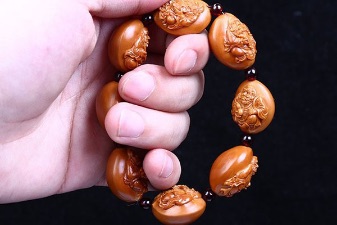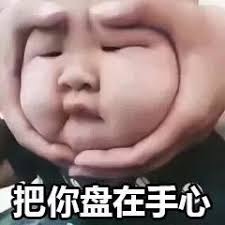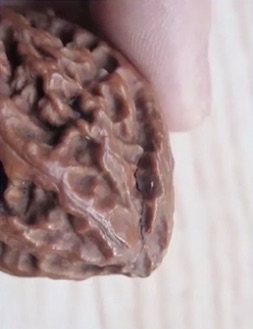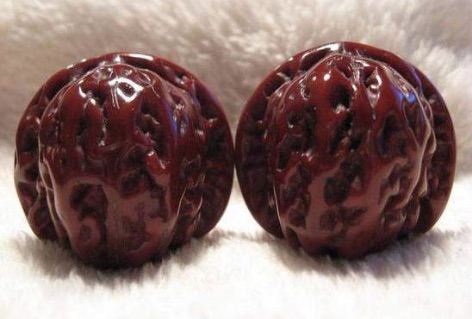"Rondle it!"
« previous post | next post »
I recently became aware of a viral new meme in China, but didn't know what it meant or even how to pronounce it. The characters are 盘他, which superficially, literally would seem to mean "plate him / her / it". Of course, that doesn't make sense, so 盘他 flummoxed me for quite a while.
Since the expression seemed so alien and odd, I thought that maybe the second character had a special topolectal pronunciation and would have pronounced the whole expression as pán tuō, but that was just a wild guess, and it wasn't long before I learned that the term should be pronounced "pán tā", the usual way for those two characters.
I still didn't know what "pán tā 盘他" meant.
So I mentioned the term to one of my classes, and immediately all the students from mainland China started giggling and chuckling. That made me all the more intrigued.
The students explained to me that the "pán tā 盘他" meme comes from a recent xiàngsheng 相声 ("crosstalk; comic dialog" [double act / comedy duo like Laurel and Hardy, Abbott and Costello, etc.]) show named "Wén wán 文玩" ("Antiques for enjoyment / amusement; making fun of / with antiques").

The episode that spawned the "pán tā 盘他" meme was called "Wén wán hétáo 文玩核桃" ("Antiquarian amusement with walnuts"). These are not your quotidian walnuts, the kind you buy at the grocery store to crack open and consume the nutmeat inside. These are special walnuts that have been lovingly fondled for years or even centuries. Doing this is a peculiarly Chinese preoccupation. The object that one caresses and rubs may vary, e.g., jade carvings, beads, bracelets, etc., but walnuts are especially favored for their special tactile qualities and resultant gleam.
This activity is by no means new, going back at least to the Han and Tang dynasties. There's even a technical term for it: pánwán 盘玩 ("play [with a curio] by rolling [it around in one's hand till its surface becomes burnished and smooth]"). For as long as I've been associated with Chinese people (more than half a century), I've seen them doing this. It's relaxing, calming, and even said to be physically therapeutic. It also has an esthetic aspect, since the doodad one rolls around in one's hand eventually takes on a smooth sheen from the prolonged rubbing and the natural oils from one's palm. In the crosstalk performance about walnut cuddling, there was a great deal of emphasis on bodily oils being imparted to the shell of the pet walnuts.
So pánwán 盘玩 ("playing [with a curio] by rolling [it around in one's hand]") is not at all an innovation. What's new is the application of this action to all sorts of other things, some of which we demonstrate below.
The original crosstalk sentence that was the source of the explosive meme is "gāngān bābā de, mámá làilài de, yīdiǎn dōu bù yuánrùn, pán tā! 干干巴巴的,麻麻赖赖的,一点都不圆润,盘他!" ("dry and dusty, pocky and gnarly, not at all round and smooth; rondle* it!").
[*Here I've resurrected an old English noun that sounds like "fondle" and means the same thing as pán 盘 to act as a transitive verb on the following object.]
Here's a picture of someone rondling a bracelet:

That's the basic significance of pán 盘 ("rondle") as a neurotactile verb. Once that meaning was firmly established in the current lexicon, it quickly came to be applied to all manner of things and took on extended meanings:
nòng 弄 ("fool / play around with"), zhémó 折磨 ("torture; torment; harass"), gǎo 搞 ("provoke; deal / clown around with") — from both positive and negative perspectives).
Here are a couple of illustrations of advanced rondling:


Returning to the sine qua non of rondling / 盘ing, the walnut, here are some exuberant observations from a PRC graduate student:
Pán 盘 means to smooth the creased and pocked shell of a walnut so that it would become radiant and reddish! The more smoothly the shell turns out, the more highly prized the walnut is, as well as the more expensive. A good walnut is something similar to a snuff bottle, very precious and emanating a sense of connoisseurship. But if the walnut's shell is uneven, rough, harsh, and not mellow, then it is málài 麻赖, not worthy at all.
To visualize málài 麻赖, here are two images to describe what it is and what it is not: the before and after of the rondling / 盘ing of a walnut.
This is a walnut before being rondled / 盘ed, which is very málài 麻赖:

And here are two perfectly rondled / 盘ed walnuts, not málài 麻赖.

And there you have it. That is why rondling / 盘ing (of walnuts and all sorts of other things) has become a matter of such great importance today.
Addendum
"Walnut shell" is a technical term in English referring to the crushed product that can be used for abrasive / blast media and that has a wide variety of applications, including the removal of graffiti!
[Thanks to Zeyao Wu and Qing Liao]
David Marjanović said,
February 25, 2019 @ 4:03 am
The fourth photo saves my day. ^_^
loonquawl said,
February 25, 2019 @ 6:45 am
So how is this meme used? Is the slogan applied to things one would like to rondle, things one would not like to rondle but is pushed by society to rondle? Is it about making things that are unpleasant more likeable by using them a lot? Or the same, but sarcastically? Is it just an infatuation with the term, comparable to the rise (and fall) of 'hygge'?
Gabriel Holbrow said,
February 25, 2019 @ 1:02 pm
For most Americans, probably the most famous rondler (to extend Professor Mair's coinage) is Humphrey Bogart as Captain Queeg in The Caine Mutiny.
https://youtu.be/ZPjZqz6STK0?t=2m10s
jin defang said,
February 25, 2019 @ 1:14 pm
so just like the worry beads people have been "rondling" for centuries?
Victor Mair said,
February 25, 2019 @ 4:43 pm
From Qing Liao:
This post is so clear, as well as eruditely elaborated that I, a Chinese, can hardly claim that I knew panta until I read it! Plus it is extremely accurate to use "pet walnut" to capture the sense of chǒng 宠 ("pet") in antiques for enjoyment. In fact this reminds me of 茶宠 chachong, tea pets which refer to little toys placed on a tea tray, like these,
If one is an expert in the art of tea ceremony, then he or she may want to keep their tea pets by pouring precious tea to nourish them. Most tea pets are made from purple sand and porcelain, and their empty-center structure produces bubbles when liquid is poured over them. This activity is supposed to symbolize one's cultural cultivation and elegant taste.
There are actually two ways to nourish a tea pet: (1) you can put the pet into a bucket of tea and soak the pet for two to four days, and (2) you can very patiently pour a cup of tea to it day by day and someday it will turn out mellow!
Victor Mair said,
February 25, 2019 @ 6:59 pm
From somebody who knows the movie and the book well, I'm told that Queeg was neurotic and burned out, "unfit for command. However, his wardroom should have supported him." I suppose those metal balls he rondled in his hand helped to calm him down.
=====
The Steel Balls
Captain Queeg's steel balls are the most prominent symbol in the novel. Whenever Queeg becomes frustrated or unsure of himself, he reaches for the balls, which he rolls incessantly in his hand. Since Queeg strives for perfection and control, but rarely achieves it, the balls can be seen as a symbol of his neutered masculinity. During the trial, one of the Navy psychiatrists suggests that the balls could be "an expression of rage and hostility toward the world."
From:
"The Caine Mutiny: Metaphor Analysis"
http://www.novelguide.com/the-caine-mutiny/metaphor-analysis
=====
Queeg's Metal Balls
The two tiny metal balls that Captain Queeg constantly rolls around between his fingers are a symbol of his mental problems. The balls are like his security blanket, without which he would fall apart. The balls make the captain's nervousness and insecurity visible to the world. The turning point of the court martial comes when Greenwald badgers Queeg to the point that Queeg has to take out the balls to keep himself from falling apart.
From:
"The Caine Mutiny Main Ideas" by Herman Wouk
https://www.sparknotes.com/lit/cainemutiny/symbols/
=====
"'Caine Mutiny' Worry Balls. Featured here are the steel worry balls used by Humphrey Bogart in the role of Captain Queeg"
https://entertainment.ha.com/itm/memorabilia/comic-related/-caine-mutiny-worry-balls-featured-here-are-the-steel-worry-balls-used-by-humphrey-bogart-in-the-role-of-captain-queeg-i/a/612-23167.s
=====
Ricardo said,
February 25, 2019 @ 9:25 pm
I feel the need to second @loonquawl question. While the original post explains clearly the origin of the expression "盘他", I don't quite get the context in which one is supposed to use it.
Victor Mair said,
February 25, 2019 @ 9:45 pm
From the o.p.:
=====
That's the basic significance of pán 盘 ("rondle") as a neurotactile verb. Once that meaning was firmly established in the current lexicon, it quickly came to be applied to all manner of things and took on extended meanings:
nòng 弄 ("fool / play around with"), zhémó 折磨 ("torture; torment; harass"), gǎo 搞 ("provoke; deal / clown around with") — from both positive and negative perspectives).
Here are a couple of illustrations of advanced rondling….
=====
There's no single context in which rondling is supposed to be used. It's multipurpose. That's the beauty of it. And compare the discussion about the steel worry balls in Caine Mutiny.
Victor Mair said,
February 26, 2019 @ 10:50 am
From Steven Owyoung:
In the late sixties, I learned of the custom of fondling small objects and metal balls during my time as a student in Taipei. The summers in the city were hot, and this was a time before air-conditioning was common in homes and apartments. The only respite from the heat was found in the movie theaters of the Ximending, all of which were air-conditioned. My favorite films were the wuxia pian 武俠片 produced by the legendary Shaw Brothers of Hong Kong. Many of the films feature one character, usually a villain or a monk, who rolled around steel balls in the palm of his hand. These balls were known as Baoding jianshen qiu 保定健身球 and were said to have originated in Baoding, Hebei during the Ming dynasty. Martial artists used them to strengthen the wrists and hands. Oldsters substituted the steel balls with walnuts.
In any case, I took up the habit when I returned home, fetching a couple of buckeye seeds from an old tree in the hills of Marin County, California where I grew up. Over the years, the seeds took on a rich patina like old fine lacquer. I still have the buckeyes locked away as keepsakes, having exchanged them for a number Korean Buddhist rosaries made of various seeds.
When I first started out in tea, again as a student in Taipei, there were no such things as chachong 茶寵, least wise at the teas of practitioners and friends I knew. About ten years later in the eighties, I do recall seeing them in Hong Kong and the Mainland.
Yesterday, totally by coincidence, I happen to be rummaging around my Chinese pillow chest, in which I keep tea utensils, and came across three unglazed clay chachong that I picked up somewhere: a qilin, a pig, and a dragon. So, your message and post came as such a surprise!
M. Paul Shore said,
February 26, 2019 @ 2:56 pm
Is it possible that the reason "pán tā 盘他" has become so popular and has provoked so much amusement is that it, like the sentence "gāngān bābā de, mámá làilài de, yīdiǎn dōu bù yuánrùn, pán tā! 干干巴巴的,麻麻赖赖的,一点都不圆润,盘他!" from which it was extracted, gives the impression of possibly being a double entendre, seeming to implicitly refer to the fondling of one or another part of the male genitalia, either by their owner or by someone else?
I should add that even if the original comedy routine gave no hint of a possible double-entendre interpretation of the sentence and the extracted phrase, that doesn't prevent the general public from furnishing them with such an interpretation in their own minds. By way of comparison, my memory is that one or more of the popular catchphrases originated by the television show Rowan and Martin's Laugh-In in the late sixties and early seventies had a double-entendre-like quality even though the show may never have done anything to directly encourage such an interpretation of them.
Stephen Goranson said,
February 27, 2019 @ 8:40 am
This reminds me of smoothed kukui nuts from Hawaii.
Victor Mair said,
February 27, 2019 @ 9:03 am
From a Chinese friend in the PRC:
盘它 is all over the place on the Chinese Internet. I once even saw it in the headline of a news program on CCTV (there, 盘它 was used to describe what the Chinese government should do in South China Sea, if other countries play 'naughty'). Banners bearing socialist slogans in bold characters are everywhere now, and I only see the number increasing…
Victor Mair said,
February 27, 2019 @ 1:23 pm
From Jonathan Chaves:
Amazing! For many years, I visited the home of John M. Crawford, Jr. on 82nd St , New York, right near the entrance to the Metropolitan Museum of Art, which now houses the greater part of his non-pareil collection of painting and calligraphy. John would aways sit at a small round table covered with jades and other exquisitely carved objects, fondling them as he spoke: "feel pieces," he called them! I had no idea there was a term for it. The objects from his collection, after his death in 1988, went in accordance with his wishes to the museum of the Rhode Island School of Design.
Victor Mair said,
February 27, 2019 @ 1:49 pm
From Alan Kennedy:
I remember being present at the home of Jean and Krishna Riboud
in Paris in 1985 when the artist Zao Wou-Ki (as the French render
his name) came to pay his respects to the dying M. Riboud. He
gave Jean two steel balls, and showed him how to manipulate
the balls in one hand. I now realize that these were the Baoding
balls that Steven Owyoung refers to.
Trogluddite said,
February 27, 2019 @ 8:57 pm
Self-administered, repetitive stimulation of one or more senses, for one or more of…
– Aiding concentration by occupying otherwise distracting mental processes.
– Refocusing the mind away from irritating or overwhelming stimuli.
– Comforting ones emotional state.
– Reinforcing ones sense of embodiment.
An autistic person might say that "rondling" is a sub-category of "stimming" (the above definition is intentionally rather loose). Hand-flapping, rocking, jumping, etc. are the stereotypical kinds of stimming which many people associate with autism, because they stand out; but it can take a huge variety of forms, many completely innocuous. Many autistic people will tell you that they consider it an instinctive form of self-regulation, and that suppressing it can impair their emotional state or their mental faculties; and this is my own experience of it.
The strength of the compulsion to do it, and the degree to which the behaviour itself is considered socially acceptable (or is potentially harmful) may differ for some autistic "stims", but I firmly believe that the same principles apply to anyone. So, it's very pleasant to read about this long cultural tradition which recognises the benefits of fiddling with things – and with such beautiful objects to show for it, too (unlike the unruly beard that I usually employ for this purpose!)
Rondle away – I highly recommend it! (I rather like the ring of the word, too.)
Victor Mair said,
February 27, 2019 @ 9:39 pm
From a Chinese friend in the PRC:
I know the meaning of pán 盘("playing [with a curio] by rolling [it around in one's hand]") when used in pánwán 盘玩, but didn't realize its meaning had extended with pán tā 盘他 until I read your blog. So everything could be pán 盘ed to smooth its sharp edges to become burnished. It reminds me of a similar but more aggressive saying, xiāo tā 削他 ("pare it"), once quite popular among young people.
Victor Mair said,
February 28, 2019 @ 3:22 pm
From a female Chinese art historian in the PRC:
Tn my mind, in China, besides the Buddhists who count prayer beads, usually only men enjoy “rondeling it”.
Victor Mair said,
March 2, 2019 @ 11:57 pm
From Paula Roberts:
I have a pair of walnuts that I bought in a flea market years ago in Shanghai. The owner of the stall showed me how to “use” them. I thought that they might have been carved of wood because they are so smooth and worked-looking. But maybe they are walnuts in fact. In either case, they have surely been rondled a good deal.